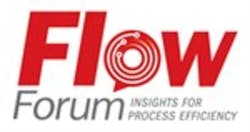Flow Forum 2018: Insights for process efficiency
Process Flow Network’s inaugural Flow Forum conference will acknowledge two challenges that face industrial process manufacturers:
- How to effectively transfer knowledge from an aging engineering workforce to a new generation of engineers and technical professionals
- How to effectively leverage the full capability of modern technologies for process efficiency
Topics covered through keynotes, breakout sessions, networking events and exhibits include:
- Filtration
- Flow measurement
- Level measurement
- Pressure measurement
- Temperature measurement
- Pump systems
- Valves and actuators
- Digital transformation/Industrial Internet of Things (IIoT)
Breakout sessions
The following breakout sessions will be of particular interest to attendees in the industrial water and wastewater management sector.
Realizing the benefits of IIoT-enabled pumps, valves and equipment
Todd Loudin, Flowrox
May 7
11:00 a.m.–12:00 p.m.
Connecting pumps, valves or virtually any asset within a facility is becoming cost effective. Combining IIoT monitoring with a digital twin replica of the asset, process or entire facility unlocks significant opportunities to reduce costs, make safer work environments, improve productivity and improve profitability. The influx of millennials and Generation Z in the coming years is going to change the manner in which we experience process plant control and monitoring. This presentation will demonstrate how visual plant monitoring can be beneficial to all user groups, such as management, safety and maintenance. The potential financial benefit and increased productivity will be examined, highlighting how companies embracing IIoT technologies are performing in the top 25 percent when compared to their peers. Case studies will show how the right system-monitoring process can help plants gain as much as one full month of production per year.
Power plant water — wanted dead and alive
Jim Lauria, Mazzei Injector
Mike Spillner, Mazzei Injector
May 7
2:45 p.m.–3:45 p.m.
Water is the lifeblood of electrical power plants, whether they are water-cooled steam plants or turbine-spinning hydroelectric installations. Regardless of how the facility generates electricity, there is a growing awareness that each power plant is part of its own, unique industrial watershed — drawing water from the environment, altering its contents and temperature, releasing some to the atmosphere as steam, and returning the rest to receiving waters. That is a deep responsibility, and awareness of it is pushing the issue of dissolved oxygen (DO) to the surface in many conversations about water treatment at power plants. In the power plants themselves, oxygen in the water accelerates corrosion of equipment — DO is aggressively minimized. However, as water is returned to nature, DO must be renewed and replaced to prevent harm to the aquatic ecosystem and to meet regulations set by local and national environmental agencies. This presentation will discuss the latest in process technologies to elegantly and cost-effectively treat effluent water to increase dissolved oxygen levels.
Optimizing the steam generation cycle and condensate recovery process for profit
Donald Hite, Magnetrol International
Thomas Kemme, Magnetrol International
May 8
11:00 a.m.–12:00 p.m.
The primary metals, petroleum refining, chemical process, food processing and pulp and paper industries allocate significant portions of their total energy consumption — anywhere from 10 to 60 percent — to steam production. Instrumentation plays an important role in key applications throughout the steam generation cycle. As a consequence, instrument-induced errors, calibration nuances and vulnerabilities to process dynamics can have an immediate and adverse impact on fuel consumption while contributing negatively in other aspects of the process — be it makeup water requirements, excessive boiler blowdown, energy transfer, etc. This presentation will identify key areas in the steam generation cycle, condensate recovery system and waste heat recovery process where cost-effective instrumentation solutions offer a tangible return on investment over the short term. The goal is to reduce heat rate, environmental impact, fuel and water consumption, and water treatment and maintenance costs in commercial and heavy industries where steam generation is essential to the production process.
Benefits of upgrading from batch filter presses to continuous vacuum filtration
Barry Perlmutter, BHS-Sonthofen
May 8
2:15 p.m.–3:15 p.m.
Madison Industries and BHS-Sonthofen Inc. have worked together through laboratory testing and field pilot testing to develop an optimized filtration process for a zinc oxide product. The current process uses a plate and frame filter press for the filtration of a zinc oxide slurry made up from a mix of various zinc material sources. The Madison objectives were to expand the production and replace the present labor-intensive process with a continuous operation. Creativity and "outside-the-box" thinking were critical as Madison and BHS engineers looked at the process from new vantage points to replace existing filter presses. Continuous vacuum filtration was selected to provide maximum filtration efficiency and improve product quality while increasing yield and reducing operating and maintenance costs. With the installation of the vacuum belt filter in 2016, Madison has realized a 50-percent savings in wash liquids per batch, as well as a reduction in labor and operating costs as the vacuum belt filter is a fully automatic operation. The Madison and BHS collaboration illustrates a successful relationship between client and technology supplier with lab testing, pilot testing, and idea-generation leading to optimized process solutions for critical and difficult solid-liquid separations.
Keynote address
University of Dayton Mechanical Engineering Technology Professor Joseph Untener, P.E., will kick off the event during the general session with his keynote, "Bridging the divide between veteran engineers and the next generation of technical professionals." Untener is co-author of the textbook Applied Fluid Mechanics. His experience gives him insight into the mindset, preparation and expectations of recently hired engineers, as well as a sense for what qualified professionals need to maintain systems and use today’s high-tech instrumentation and control systems. During his opening address, Untener will offer a blend of ideas, tools and questions about optimizing the interaction between seasoned engineers and the next generation of technical professionals to better meet the needs of modern industrial organizations.
Register early to save
To learn more and to register, visit flowforum2018.com. Register by Jan. 31 to save $100 off the registration price. Group rates and government discounts are also available.
CONFERENCE
Mon., May 7, 12–1:30 p.m. and 5–6 p.m.
Tue., May 8, 7:30–8:30 a.m. and 12–1 p.m.
The Westin O’Hare
Rosemont, Illinois (Chicago)

